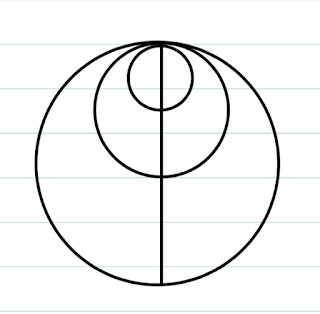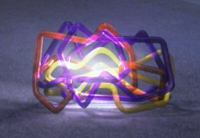Pi and Free Will
Pi day (3/14) was 10 days ago, and my blog post is late. Modern scientists tell us, however, that there is no such thing as free will, and that my lateness was pre-determined, unavoidable, and thus arguably, "not my fault."
The "no free will" thought experiment goes as follows: imagine we are all physical systems where every interaction can be known and measured. Given enough data and computational ability, identifying cause and calculating effect delivers predictable outcomes with 100% accuracy.
If we accept determinism, that our lives from birth to death have already been set, where does our moral responsibility go? Why try at all?
The Atlantic wrestles with these questions in There's No Such Thing as Free Will (But we're better off believing in it anyway). The sub-heading gives it away, indicating that scientists have publicly walked back their argument, "Ha ha, we were just trolling all of you," but privately still think we have no free will.
By way of analogy and in honor of Pi Day (belatedly), Pi offers some insight and support for free will. We know Pi to be the circumference of a circle divided by the diameter: π = C/D.
We also know that Pi goes on forever without a repeating pattern: π = 3.1415926535897932384626433832795...
On this point, Pi seems analogous to "no free will" as every successive digit of Pi can be calculated, making its "shape" preordained. What isn't preordained, however, is our willingness to look for the next digit. This act of free will, to look or not to look, is admittedly small and unsatisfying as it does nothing to change the "shape" of Pi, but there is meaning embedded here.
Consider that the degree of willingness to look varies from person to person. Most are satisfied to know Pi as 3.14. Others are happy with what the π button on their calculator displays. Some have memorized the value up to 100 digits while outliers have memorized it up to tens of thousands of digits. Recently, a Googler by the name of Emma Haruka Iwao calculated Pi to a record number of digits: 31,415,926,535,897, a count that was no accident.
When people with varying "willfulness" interact, a certain amount of randomness -- the countervailing force to determinism -- is introduced into the system. Also, knowing that Pi is an irrational number that cannot be calculated with 100% accuracy, is to recognize that we have irrational components in our reality. Recall that determinism requires 100% accuracy. Therefore, randomness and irrationality mean the future -- society's future -- can be fluid rather than static. Of course, while determinism precludes free will, randomness does not guarantee it. But the willingness to look, by definition, is free will, and we have Pi to thank for that.
The "no free will" thought experiment goes as follows: imagine we are all physical systems where every interaction can be known and measured. Given enough data and computational ability, identifying cause and calculating effect delivers predictable outcomes with 100% accuracy.
If we accept determinism, that our lives from birth to death have already been set, where does our moral responsibility go? Why try at all?
The Atlantic wrestles with these questions in There's No Such Thing as Free Will (But we're better off believing in it anyway). The sub-heading gives it away, indicating that scientists have publicly walked back their argument, "Ha ha, we were just trolling all of you," but privately still think we have no free will.
By way of analogy and in honor of Pi Day (belatedly), Pi offers some insight and support for free will. We know Pi to be the circumference of a circle divided by the diameter: π = C/D.
We also know that Pi goes on forever without a repeating pattern: π = 3.1415926535897932384626433832795...
On this point, Pi seems analogous to "no free will" as every successive digit of Pi can be calculated, making its "shape" preordained. What isn't preordained, however, is our willingness to look for the next digit. This act of free will, to look or not to look, is admittedly small and unsatisfying as it does nothing to change the "shape" of Pi, but there is meaning embedded here.
Consider that the degree of willingness to look varies from person to person. Most are satisfied to know Pi as 3.14. Others are happy with what the π button on their calculator displays. Some have memorized the value up to 100 digits while outliers have memorized it up to tens of thousands of digits. Recently, a Googler by the name of Emma Haruka Iwao calculated Pi to a record number of digits: 31,415,926,535,897, a count that was no accident.
When people with varying "willfulness" interact, a certain amount of randomness -- the countervailing force to determinism -- is introduced into the system. Also, knowing that Pi is an irrational number that cannot be calculated with 100% accuracy, is to recognize that we have irrational components in our reality. Recall that determinism requires 100% accuracy. Therefore, randomness and irrationality mean the future -- society's future -- can be fluid rather than static. Of course, while determinism precludes free will, randomness does not guarantee it. But the willingness to look, by definition, is free will, and we have Pi to thank for that.




Comments